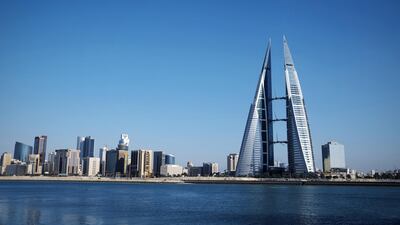Bahrain is empowering the public by not enforcing a full lockdown amid the coronavirus crisis, residents told The National, as they prepare for the Eid Al Fitr holiday.
The country has recorded over 8,000 cases of the virus with 12 fatalities since the outbreak began, but is choosing not to enforce an economic lockdown during the holidays.
“Bahrain has set clear guidelines although they haven’t put in place a complete lockdown. They have empowered the citizens to make the right decision,” said Salma Bader, a resident of Manama.
Ms Bader, who is a learning and development director at Microsoft, said residents in the Gulf “have been very lucky” due to the rapid responses taken by regional governments.
“The government has truly done a lot but it’s also the citizens' responsibility to make the right choices, understand and commit to the guidelines,” she said.
Bahrain took a series of early interventions to curb the spread of the deadly virus, which includes screenings at entry points, travel restrictions on high-risk areas, banning of large social gathering as well as swift isolation and testing of suspected cases.
The government made it mandatory to wear masks outdoors after easing some restrictions at the start of the Holy month of Ramadan.
Government campaigns encouraging people to stay at home and to avoid gatherings has helped to flatten the curve, Fahad Al Wazzan, a Bahraini citizen, said.
“It helped a lot. I think Bahrain is one of the very few countries that did not impose a lockdown but managed to flatten the curve into a steady horizontal line,” Mr Al Wazzan said.
Haif Shukri, a data warehouse analyst in Mamama, has been working from home since coronavirus measures were imposed on the public.
“Although we haven't been in a lockdown, markets have been kept open and we have only been going to buy necessities, the rest is delivered to us,” Ms Shukri said.
Ms Shukri and her and her husband have not been able to spend a lot of time with family, although they live very close to them.
“The in-laws live five minutes away from us, but since coronavirus spread in Bahrain we haven't been able to see them for longer than 15 minutes,” she said.
Unconventional Eid Al Fitr
It is set to be an unconventional Eid for the majority of Muslims as stay-home orders remain effective, with mosques remaining closed and large gatherings banned.
Bahraini authorities said they will not implement a curfew during the holiday season.
Mr Al Wazzan usually spends the holidays with his friends and family but this year he plans to see them virtually.
“This Eid is totally different than in previous years, it is mainly about gatherings with your families, but as we are in 2020, I guess we can still wear our new fancy clothes and see them on video calls,” he said.
Ms Bader is on a mission this Eid to create “happy and fun vibes” to celebrate with her children.
“The vibes are already starting at home with decorations and buying new clothes and toys (online) for the kids to feel the joy of Eid,” she said.
Her family lives in Saudi Arabia, which means that they will not be able to celebrate together.
“We are in an era where voice and video calls have kept us together and our Eid family call is already set. So will be wearing our new clothes, a smile and looking forward to that family call as well,” she said.
Ms Shukri, who just recently gave birth to a baby boy, said she will pass by her family in-law’s house and see them but will maintain her distance.
“It feels like we are distanced and lonely, considering my husband’s family all live here and we can't see or be with any of them,” she said.
“Abdulrahman [baby boy] is growing to believe that we are the only two people on earth,” she said.


